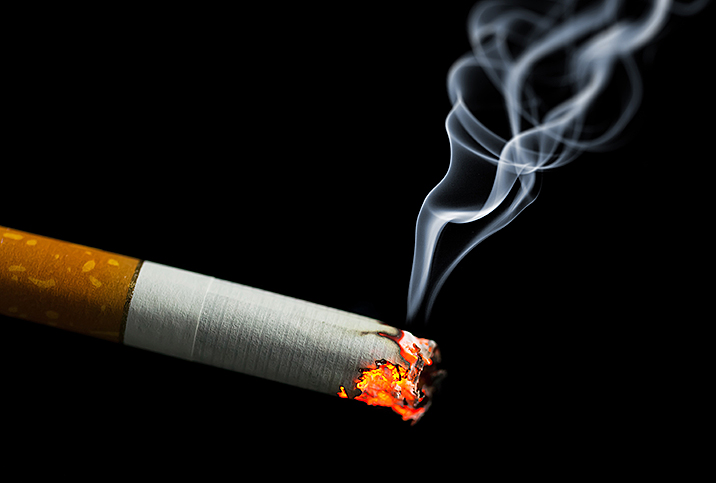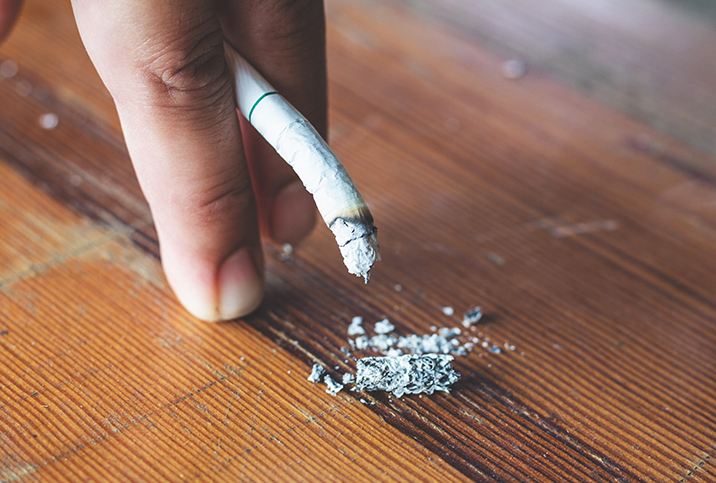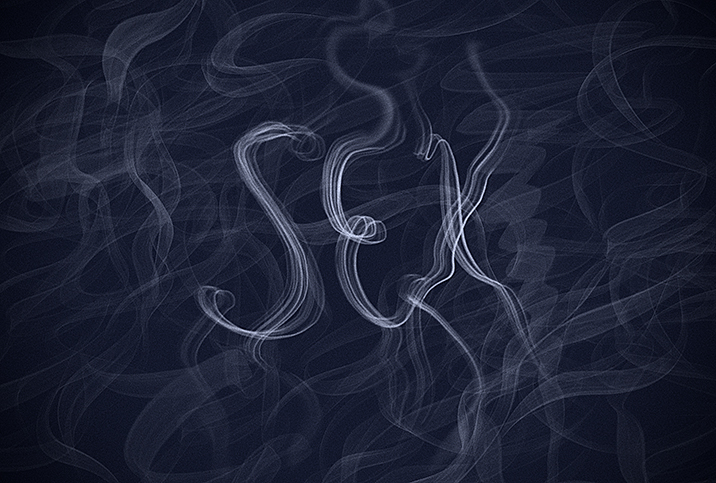Cigarettes May Be Affecting Your Ability to Get It Up

Whenever urologist Petar Bajic, M.D., sees a smoker who has erectile dysfunction, he gives them something to think about long after they leave his office.
"Every time you light up a cigarette, I want you thinking about your penis," he tells them.
Does it work? Yes, it does, said Bajic, who practices at Cleveland Clinic's Center for Men's Health at the Glickman Urological and Kidney Institute. Many of his patients have disclosed that learning how tobacco use contributes to erectile dysfunction provided motivation to quit smoking.
And Bajic isn't alone in recognizing the power of the penis when it comes to smoking cessation.
It's one of the biggest motivators for patients, said Helen Bernie, D.O., a urologist and the director of sexual and reproductive medicine at Indiana University.
"Hey, keep smoking and you're not going to be able to get an erection," Bernie said.
Everyone knows smoking is bad for them. But what's not common knowledge is that smoking is among the causes of erectile dysfunction (ED), defined as the consistent inability to achieve and maintain an erection firm enough for sex. Studies indicate men who smoke are at a higher risk for ED.
"I see young guys in their late 30s, early 40s, who've been smoking for 20-plus years," Bernie said. "These guys already have significant erectile dysfunction."
Why does smoking contribute to ED?
Smoking can cause ED both directly and indirectly, according to Bobby Najari, M.D., a urologist at NYU Langone Health in New York City. Directly, smoking damages the blood vessels in the erectile tissue of the penis, which inhibits the ability of the blood vessels to dilate, an action that must occur for an erection to happen.
Indirectly, smoking is associated with many health problems, such as high blood pressure and diabetes, that are causes of ED.
"All of these things are risk factors for erectile dysfunction because high blood pressure damages the blood vessels in the body, and diabetes damages the nerves in the body," Najari said. "Because [smoking] correlates with all these other negative health problems, that can lead to erectile dysfunction."
Additionally, smoking can lead to cardiovascular disease, which narrows arteries and creates blood flow issues throughout the body.
"Because erections rely on blood to flow into the penis through two arteries that are about 1 millimeter in diameter, these arteries can be the first to be affected by cardiovascular disease," Bajic said.
Smoking may also reduce the body's levels of nitric oxide, a compound that plays a vital role in erections by allowing blood vessels to dilate, or open up.
Among the top causes of ED for younger men
Smokers in their 30s with ED can likely thank smoking for their erectile issues because it is one of the more common potential causes, Bajic said. (He also pointed out that he sees a lot of nonsmokers in their 20s and 30s who have ED due to other factors, such as performance anxiety and pelvic floor dysfunction.)
Plus, the damage caused by smoking is visible with the right technology. Ultrasound enables urologists to see the direct impact of smoking on younger men.
Bernie uses a procedure called penile duplex Doppler ultrasound. The patient is injected with an erectogenic agent that induces an erection, and the color duplex Doppler ultrasound enables Bernie to evaluate arterial blood flow in the penis and venous outflow.
"These guys who have already been smoking for 20-plus years, who started in their teens, we're already seeing significant arterial insufficiency and early venous leak," she said. "This is huge, because these are young, healthy guys. Smoking tobacco is already causing significant endothelial damage," which refers to damage to the lining of the blood vessels.
Effects may be reversible
Men who quit smoking may reverse some of the damage, but not completely. If smokers are otherwise healthy and show only early signs of cardiovascular disease, they can improve their erections if they stop smoking, especially if they also get regular aerobic exercise.
"However, we also know that sometimes the damage that's been done by smoking and other risk factors can actually be permanent," Bajic said.
Najari added there is evidence smoking cessation can be beneficial for erectile function in certain populations, especially younger men with more mild cases of ED. As for older men who have been smoking for decades and have severe ED, there is generally not much improvement with ED when they finally quit.
"That's why it's important to counsel people at a younger age before the long-term effects of smoking add up," Najari said.
More smoking, more damage
Damage from smoking accumulates, meaning the more cigarettes a guy smokes per day and the more years he smokes, the greater the effect on his cardiovascular system, according to Bajic.
Bernie noted men may initially experience mild ED, and the longer they smoke, the severity worsens. However, determining the amount a man has to smoke before it affects erectile function is not an exact science, Najari noted.
"I don't think there's a threshold where you can say that below this threshold, there's no impact, and above this threshold, that's when you start to notice it," Najari said. "The bad news is that any smoking, I think, would have some negative impact. But the good news is that it's dose-related, so even cutting back is going to have a beneficial effect."
Quit smoking or risk ED
While men know smoking is bad for them, understanding the sexual ramifications may provide the motivation needed to quit.
"I think when you generally tell people these things are bad for you, that can make less of an impact than when you tell people these conditions are directly responsible for sexual problems they're having," Najari said. "That can be a better motivator for someone to take more control over their health."
While quitting is great, prevention is best.
"Don't get started," Bernie said. "If you smoke now, stop. Don't let it be 50, 60, 70 years. The longer you have exposure to obesity, high blood pressure, tobacco use, diabetes, the greater the impact to your health and the detriment to your erections."


















